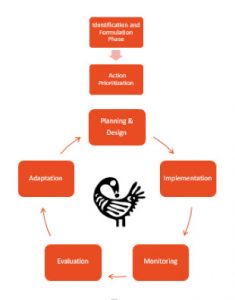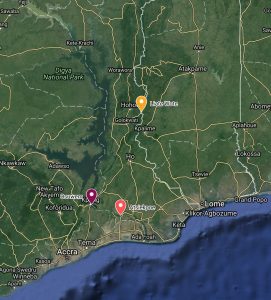Strategy 2016-2020
Note: A strategy for 2021-2023 is being worked on and will be published here shortly.
In line with our mission statement, our aim for the coming years is to assist (potential) eco-tourism destinations in advancing their eco-tourism potential and to ensure that these eco-tourism activities contribute to achieving the overall development aim identified by the community.
Responsible tourism as principle
SSFA believes and has seen proven that eco-tourism can be a stepping stone to community development and improved living conditions. This focus was derived from many years of working experience of SSFA with Jolinaiko Eco Tours, a Ghana-based responsible travel company offering tours in West Africa. SSFA and Jolinaiko started working together in 2006 when Jolinaiko wanted to make a bigger impact in the communities they visit with tourists. Together SSFA and Jolinaiko initiated various development initiatives.
 The lessons learned from this partnership were so constructive and evident that SSFA adopted a new vision, mission and strategy, and we decided that responsible tourism would become our main principle. We are convinced that community-based eco-tourism initiatives are a great way to significantly improve the lives of the inhabitants of a community, provided that projects are initiated and sustained by the community itself or its leaders, and are not imposed by others.
The lessons learned from this partnership were so constructive and evident that SSFA adopted a new vision, mission and strategy, and we decided that responsible tourism would become our main principle. We are convinced that community-based eco-tourism initiatives are a great way to significantly improve the lives of the inhabitants of a community, provided that projects are initiated and sustained by the community itself or its leaders, and are not imposed by others.
SSFA believes that projects directed at receiving and entertaining tourists will only be successful if the people in the community and the involved tour company/companies all contribute and work together and when the community, its environment, the visiting tourists and the tour company all benefit from the situation.
Another principle we adopted is operating in public-private partnerships (PPP) where a private partner collaborates with SSFA to bring development to a community, and either makes resources available or provides market opportunities which both contribute to the sustainability of our projects.
Our aim and objectives for 2016-2020
Our aim is to assist (potential) eco-tourism destinations in advancing their eco-tourism potential and to ensure that these eco-tourism activities contribute to achieving the overall development aim identified by the community.
Ojectives
- To select five existing or potential eco-tourism destinations as target communities, based on selection criteria formulated by SSFA in collaboration with our partner Jolinaiko Eco Tours.
- To mobilize and facilitate the process for these communities to identify, develop or advance the tourism attractions that are present in the community or its environment.
- To mobilize and facilitate the process for these communities to identify the areas where development interventions are mostly needed.
- To assist communities in developing the structures that will harness their tourism potentials towards achieving the overall development goals.
- To assist the community in developing partnerships with other organizations and institutions that contribute to achieving their community development aims.
Strategy
The following strategy has been designed to achieve our objectives for 2016-2020:
- All activities are implemented through our public-partnership with Jolinaiko Eco Tours who plays a major role in selecting (potential) eco-tourism destinations. This public-private partnership ensures cost-efficiency, sustainability and innovation.
- Each community project follows the SSFA community development project cycle (Fig. 1). This ensures that initiatives are community-driven and communities are an equal partner playing a major role in decision making during each phase of the project.
- The strategy at community level is the participatory rural appraisal (PRA) aiming at mobilizing the community and facilitating a process whereby the community identifies the areas where development and intervention are mostly needed. The outcome of this appraisal determines the focus of the initiative and the actions that need to be taken to design and plan the final project (see text box below).
- Each project has its monitoring and evaluation measures depending on the design of the project.
- Being a learning organization is another component of our strategy. Based on our experience of conducting appraisals, SSFA aims at launching a successful model to grassroots development based on PAR and RRA that will form the basis for new private-public partnerships in the future (long term strategy).
Participatory rural appraisal (PRA) and Rapid Rural Appraisals (RRA)
Participatory Rural Appraisal (PRA) and Rapid Rural Appraisals (RRA) are terms that are widely used by non-governmental organizations (NGOs) and other agencies involved in international development.
The PRA approach aims to incorporate the knowledge and opinions of rural people in the planning and management of development projects and programs. Hundreds of participatory techniques and tools exist. To ensure that people are not excluded from participation, these techniques avoid writing wherever possible, relying instead on the tools of oral communication like pictures, symbols, physical objects and group memory.
The main drive behind this model is decentralization and inclusive empowerment which enable local people (men, women, youngsters and elderly) to exploit the diverse complexities of their own conditions, and to adapt to rapid change. Rapid Rural Appraisal (RRA) consists of a series of techniques for “quick and dirty” research that are claimed to generate results of less apparent precision, but greater evidential value than classic quantitative survey techniques.
SSFA will select and practice the most suitable PRA and RRA techniques to use, of which a manual will be developed.
Financing
- The public-private partnership (PPP) approach with Jolinaiko Eco Tours ensures that the overhead funds are kept to a minimum.
- Jolinaiko Eco Tours make office space including utilities (internet, electricity, etc.) available free of charge from 2016-2020.
- Jolinaiko Eco Tours contributes to the salary of a part-time Chief Operations Officer whose responsibilities are the day-to-day activities of the organization.
- Jolinaiko Eco Tours covers the cost of the first phases of the project cycle (identification, prioritization, planning and design as described in Fig. 1) in all five selected tourism destinations.
- SSFA board members facilitate on a voluntary base, and the community contributes where possible in hosting events.
- External funding is solely used for funding direct project costs, and depending on the scope of the project for facilitating the implementation, monitoring, and evaluation.
- Every partner community is responsible for contributing a significant percentage of the project cost in cash or kind.
- For each project, we assist the community in raising a minimum of 30% of the budget locally through fundraising activities/festivals, proposal writing to local government and corporate bodies, local NGO’s and philanthropists.
- SSFA or partner organization will raise the additional 70% through crowdfunding and applying for funds through (inter)national development agencies or other fundraising methods.
Target communities
Three (potential) eco-tourism destinations have been selected in May 2016 and a lot of work has been done in these communities since then. Preparations are underway to identify the other two potential eco-tourism destination for 2018/2020 period.
- Atsiekpoe-Battor, North-Tongu District, Volta Region. Eco-tourism destination established by Jolinaiko Eco Tours in 2008.
- Kroboland with special emphasis on surrounding villages like Krobo Odumase and Osuwem. These communities are potential eco-tourism destinations with tourism attractions such as the Dipo Puberty Rites festival and the Krobo mountains.
- Liate Wote, Afadzato South District, Volta Region. Existing and popular eco-tourism destination frequently promoted by Jolinaiko Eco Tours.
Atsiekpoe-Battor, North-Tongu District, Volta Region
SSFA has finished the identification phase in Atsiekpoe and designed a project with the community focused on improving health care. The ultimate aim is establishing a Community-based Health Planning Service (CHPS) Compound, a basic health care facility that operates in partnership with the local government.
At the time of writing, the community has been able to achieve the first phase of the project and finished the substructure of the building.
Focus for 2018/2020
- Mould environmentally friendly bricks to commence the second phase (super structure).
- Finish the roofing, painting, electrical works (renewable power source construction), plumbing and the resourcing of the facility for use.
- Construct integrated environmentally friendly places of convenience and develop environmental conservation systems like sustainable green landscaping.
All information about this project can be found on our Green Clinic pages.
Kroboland, Dodowa District
The communities have expressed interest in linking development to tourism which has been supported by Jolinaiko and other colleagues like Homeland Exploration Tours and Galaxy Tours.
An introductory meeting has taken place in May 2016 where the paramount chief and queen mother of Osudoku Traditional Area showed interest in community-based tourism and especially in linking development to their Dipo Puberty Rites.
SSFA has started with its first step which is Identification and Formulation.
Focus for 2018/2020
- Increase SSFA’s visibility and impact in these communities through sensitization programs on eco-tourism and its impact on development, education on reproductive health.
- Continue to engage the community in identifying their strengths and challenges.
Liate Wote, Afadzato South District, Volta Region
Liate Wote is a popular eco-tourism destination in Ghana, and Jolinaiko is expanding its lodging services by building a lodge in the community. SSFA and Jolinaiko have been involved in capacity building activities over the years and build constructive relationships with the traditional leaders and the executive board of the tourism project. These local leaders have recognized a need to reassess the existing project.
SSFA using its rural participatory approach has carried out the following; Identification of strengths and challenges through transect walks, and needs prioritization.
Focus for 2018/2020
- Continue to engage the community with the aim of finalizing their developmental priorities that have ties to eco-tourism, land use and nature conservations.
- SSFA together with the community, based on the particular need prioritized, will then identify a development project to undertake.
Latest news articles
- Update Liati Wote plastic recycling project and Green Hub, March 2022
- Update Liati Wote plastic recycling program March 2020
- Liati Wote community development – Report 6: Creating Awareness Using Wall Paintings
- Liati Wote community development – Report 5: Mounting the segregations waste bins
- A new board member, Chief Sanitation and Development and great help with our plastic waste project
- Liati Wote community development – Report 4: Introduction of the plastic recycling project
- Building The Green Clinic – update february 2019
- Building The Green Clinic – update january 2019
- Building The Green Clinic – update december 2018
- Building The Green Clinic – update november 2018
- Building The Green Clinic – update july 2018
- Building The Green Clinic – update may 2018









